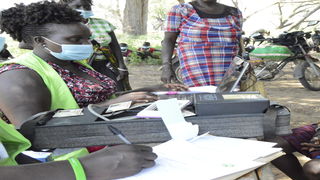
Lodomorok Tuwot, 75, registers as a voter for the first time at Nakoko in Tiaty East on October 7, 2021. Reports indicate that thousands of locals in the remote areas in the region have not acquired identification cards, a situation also crippled their school-going children to acquire birth certificates. This has led to a crisis as they don’t receive education funds for not being in the education portal, NEMIS.
| FLORAH KOECH| Nation Media GroupBaringo
Premium
Why thousands of learners in Tiaty have no birth certificates
What you need to know:
- Those captured by the government data are only a quarter of the entire institution, the reason being, that the others have no birth certificates
- The situation has affected learning institutions because the government is only providing funding to learners who have been captured in Nemis
Head teachers in some primary schools in Tiaty Constituency are concerned that thousands of learners cannot be registered under the National Education Management Information System (Nemis) because they lack birth certificates.
Nemis is the online portal for automated education data and related administrative functions that allows candidates to register for national examinations.
It has since emerged that many locals shy from acquiring national identification cards for fear of being linked to banditry, making it difficult for their children to acquire birth certificates.
According to Baringo County Registrar of Persons Sharon Chelimo, more than 32,676 locals are eligible to get IDs in Tiaty East and 36,056 in Tiaty West.
The situation has affected learning institutions because the government is only providing funding to learners who have been captured in Nemis.
For instance, Kositei Primary School head teacher John Apetole raised concern that out of the 302 pupils in the institution, only 89 have been captured in Nemis.

Many in Tiaty Constituency shy from acquiring national identification cards for fear of being linked to banditry, making it difficult for their children to acquire birth certificates
“Those captured by the government data are only a quarter of the entire institution, the reason being, that the others have no birth certificates. The situation has crippled the operations of the school because the government will only cater to those captured by the online portal,” said Mr Apetole.
“We only get funds for the 89 registered learners yet we have 302. This has forced us to share the little we get,” he added.
The school head blamed this on high illiteracy levels as parents do not understand the need to have an identification card or their children getting birth certificates.
Perennial insecurity and the nomadic nature of the community have also seen those living in remote villages in Tiaty East and Tiaty West sub-counties shun the exercise of acquiring IDs.
“Many parents in remote villages in Tiaty lack knowledge on the importance of their children getting birth certificates and them having an ID to help in the processing of the same. We have tried as an institution to convince the parents to get the birth certificates but only a few have complied,” Mr Apetole explained.
The head teacher appealed to local leaders, administration officers and professionals from the area to sensitise residents on the importance of acquiring a national ID and for their children to get birth certificates.
“Stakeholders should assist in lobbying to have a Huduma Centre in Chemolingot Town, the constituency’s headquarters, to ease the burden of locals traveling for hundreds of kilometres to the county headquarters in Kabarnet to get IDs and the certificates,” said the head teacher.
“There is a need for the government to bring such services closer to the people because most of them do not access government services due to a lack of identification cards,” said reiterated Paul Todopong, a resident, who noted that some parents resorting to using other peoples’ IDs.
Todopong said locals refuse to take up ID cards for fear of being associated with bandits and tracked down by authorities.
Kapedo East chief Lomonasiwa Lopeleng'uria claimed many armed criminals go into hiding in remote villages to avoid being nabbed and they avoid getting IDs to scuttle any attempts of being tracked.
“Most of those youths who do not have identification cards are those who are engaging in crimes and perceive that they will be easily smoked out in their hideouts if they get the document. Most of them use fake names to confuse those pursuing them,” said Mr Lopeleng'uria.
“The community are also pastoralists and keep moving from one place to the other. It is hard for them to travel long distances to the sub-county headquarters in Chemolingot and Tangulbei to get the IDs, causing most of them to miss out on services being offered by the government,” said the administrator.
He cited Ameyan, Toplen, Riong’o, Nadome, Chesitet, Adomeyon, Natan, Napukut, Naudo and Akwichatis as some of the far-flung areas where a majority of locals are yet to get IDs.
“Many locals do not want to travel to our offices to be registered as Kenyans and whenever we take our services to the villages, they don’t show up either. That is why we take advantage of going to the villages during market days or ceremonies to get the numbers,” added Baringo County Registrar of Persons Sharon Chelimo.
During a tour of Kositei village over the weekend, Tiaty MP William Kamket called on the government to put up a civil registration office in Chemolingot, Kolowa and Tangulbei towns to solve the problem.
“We have problems in many institutions in this constituency. You will not be surprised to get a school with 700 pupils but only 50 have been captured in the online portal, which helps institutions access government funding,” he said.




